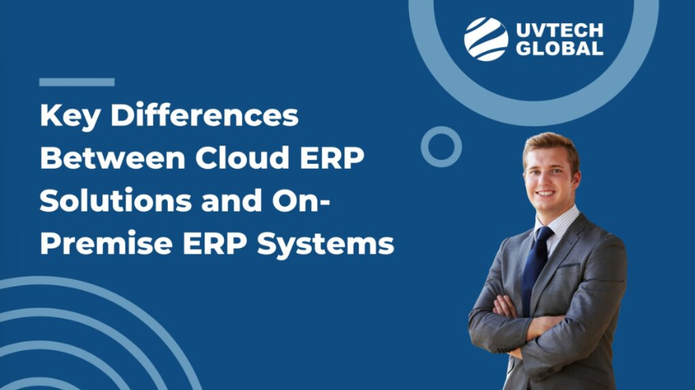UVTech Global - Key Differences: Cloud ERP vs. On-Premise ERP Systems
Choosing an ERP system can be overwhelming, but a key decision is whether to go with a cloud-based or on-premise deployment.

What Is Cloud ERP?
Cloud ERP refers to software that resides on the vendor's servers and is accessible via the Internet.
This means that we are referring to ready-made software solutions able to be integrated into your business environment immediately.
Data storage, security, updates, and support are provided by the software provider.
What Is On-Premise ERP?
An On-Premise ERP System operates on servers inside an organization's premises and can be installed and managed by employees of the organization.
With on-premise ERP, organizations have full control over their data and systems.
It's the company's responsibility to manage the system, including upgrading it and keeping it secure.
Many organizations prefer this type of ERP system for data security reasons or because it allows for a great deal of customization.
With On-Premise ERP, companies can control the system, enhance or reduce security, are responsible for hosting and maintaining it themselves.
On-Premise vs Cloud ERP: Differences to Make The Right Choice
Approximately 58% of companies prefer to run their ERP Systems in the cloud, whether private or public.
On-site platforms account for 25% of all ERP Software.
It is important to note that although these statistics may already indicate a winner, the choice between Cloud ERP and On-Premise ERP is dependent upon a variety of factors.
Time to Deploy
The Cloud ERP process is implemented by your service provider and is hosted on their server, so there is no need for any additional resources or hardware.
As a result, on-premise deployment is a time-consuming process.
As the ERP System is installed locally on your company's server, it takes additional time for the IT department to prepare and set up the required infrastructure, thus extending the time for deployment.
Accessibility and mobility
Mobile and Flexible are some of the advantages of cloud-based solutions. From any device with an internet connection, these systems allow you to access your data anytime and anywhere.
By doing this, you will gain a greater sense of control and visibility over your business operations.
The flexibility of on-premise ERP Software is lacking. When away from your office premises, these systems often have restricted remote access, making it difficult for you to manage your business.
Security Of Data
An ERP System on the cloud is usually in the hands of a professional service provider familiar with several disaster recovery and data disaster recovery processes.
In most cases, you are less likely to experience hardware or software malfunctions that might interfere with your day-to-day operations.
With an ERP System installed on-premises, your in-house It team handles data security.
A lack of effective security protocols or inefficient equipment puts your information at risk of attack and may lead to hefty losses.
Updating and Maintaining Software
The vendors of cloud-based ERP Systems manage routine software updates. To implement this change, you do not need a developer or IT administrator on staff.
In contrast, an on-premise ERP System is maintained by a full-time It administrator, who manages all software updates and version upgrades.
Integration and Scalability
The scalability of an ERP System refers to its ability to handle the growing number of users and data as your business grows.
With a cloud ERP System, this flexibility can be achieved as well as extensive integration, ensuring the system performs well regardless of the increased workload.
A traditional on-premise ERP solution can also support business expansion; however, in this instance, additional hardware deployment costs will need to be borne to enable this level of scalability.
Conclusion
ERP Hosting Solutions are custom-designed to suit the specific needs of each client, taking into account their budget, deadlines, compliance requirements, and other factors.
Taking advantage of Cloud ERP Infrastructure can be quick and easy without large upfront investments.
A locally installed system enables you to control assets in addition to customizing and integrating them in an unmatched manner.
No comments yet. Login to start a new discussion Start a new discussion